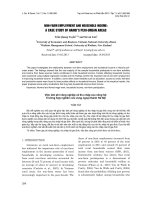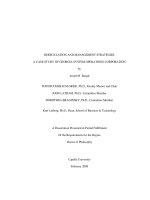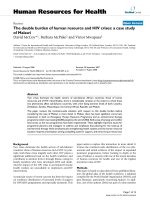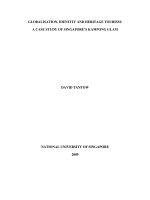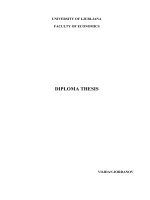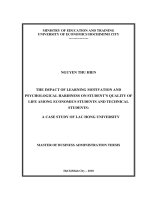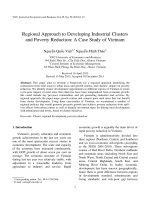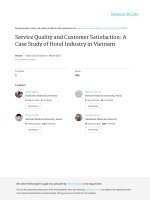deregulation and management strategies a case study of georgia system operations corporation
Bạn đang xem bản rút gọn của tài liệu. Xem và tải ngay bản đầy đủ của tài liệu tại đây (1.2 MB, 235 trang )
DEREGULATION AND MANAGEMENT STRATEGIES:
A CASE STUDY OF GEORGIA SYSTEM OPERATIONS CORPORATION
by
Joseph B. Baugh
TONI BUCHSBAUM GREIF, Ph.D., Faculty Mentor and Chair
JOHN LATHAM, Ph.D., Committee Member
DOROTHEA BRAGINSKY, Ph.D., Committee Member
Kurt Linberg, Ph.D., Dean, School of Business & Technology
A Dissertation Presented in Partial Fulfillment
Of the Requirements for the Degree
Doctor of Philosophy
Capella University
February 2008
UMI Number: 3296749
3296749
2008
Copyright 2008 by
Baugh, Joseph B.
UMI Microform
Copyright
All rights reserved. This microform edition is protected against
unauthorized copying under Title 17, United States Code.
ProQuest Information and Learning Company
300 North Zeeb Road
P.O. Box 1346
Ann Arbor, MI 48106-1346
All rights reserved.
by ProQuest Information and Learning Company.
© Joseph Baugh, 2008
Abstract
Deregulation has created framebreaking changes across multiple industries. This study
examined the impact of deregulation upon a single nonprofit generation and transmission
electrical cooperative. Deregulation and other market forces set into motion a
framebreaking change which restructured the former cooperative into three legally
distinct cooperatives that developed symbiotic relationships with each other. Based on
the literature, significant impacts to management strategies, organizational structure, and
organizational culture were expected. Through a series of interviews, study participants
articulated their experiences and perceptions about the impacts of deregulation at the
cooperative. Data analysis indicated that changes to management strategies and
organizational structure, while significant, were fairly straight-forward and consistent
with the literature. Changes in organizational culture during and after the restructuring
initially created adverse effects among the workforce. The central emerging theme
indicated that positive changes in leadership across the three cooperatives were
significant in renewing organizational effectiveness and developing a strong customer
service focus. As related by the participants, transformational leaders restored trust,
created a new vision, instilled values, improved communications, and developed
collaboration across the three cooperatives. These transformational activities created a
significant impact on the cooperative employees by improving performance, raising
morale, and elevating job satisfaction levels, which increased workforce retention. The
study revealed that transformational leadership alleviated unfavorable cultural impacts
within this organization in transition.
iii
Dedication
I’d like to dedicate this paper to the women in my life who tolerated long hours,
weeks, and months of neglect while I labored away on this project. My dearly departed
wife, Dorothy, encouraged me many years ago to put my feet on the path to pursue my
lifelong dream of obtaining higher education and gave me the time and space to follow
that dream to its logical conclusion. After Dorothy’s death in 2005, my daughter, Sara
Baugh-Harris, and my mother, Gaye Baugh, bolstered my spirits throughout those dark
days as I floundered in sorrow and self-pity and helped me work my way back to the light
through their constant caring and encouragement. As I came down to the wire, my
girlfriend, Peggy Sue Davis, supported me and gave me the confidence I needed to stay
the course and finish this dissertation. I love all of you and I truly appreciate everything
you did to help me work through despondency and despair as I struggled to finish the
journey.
iv
Acknowledgments
This paper would not have been possible without the guidance, support,
and occasional kick in the seat of the pants that I so desperately needed from my
mentor, Dr. Toni Buchsbaum Greif. You are another one of those women in my
life who helped make my dream a reality. Although I sometimes resented all the
additional research and multiple revisions that you recommended, this paper is a
much better effort for heeding your advice.
My committee members, Dr. John Latham and Dr. Dorothea Braginsky,
delivered sage insight and guidance in a timely and helpful manner. My good
friends and fellow learners: Dr. Anne Saber Hallcom, Dr. Suzanne Minarcine, and
Dr. Jerry Becker, provided me with indispensable support throughout the PhD
program, particularly after the death of my wife. What can I say to you three, but
thank-you from the bottom of my heart for all of your caring and concern? Dr.
Marilyn Harris also labored mightily to help me find an appropriate study
organization when it looked like I might have to change directions and certainly
deserves credit for her support.
Finally, I could not have completed the fieldwork without the support of
Gary Williamson and Connie Looney at GSOC. They gave freely of their time
and made my visit to Atlanta very productive. Their unflagging efforts helped me
pack 40 tightly scheduled interviews into one short week, which allowed me to
generate the rich data set that I needed to draw this project to a close.
v
Table of Contents
Acknowledgments iv
List of Tables viii
List of Figures ix
CHAPTER 1. INTRODUCTION 1
Background of the Study 3
Statement of the Problem 4
Purpose of the Study 4
Rationale for the Study 4
Research Questions 5
Significance of the Study 6
Definition of Terms 6
Assumptions and Limitations 11
Theoretical and Conceptual Framework 13
Organization of the Remainder of the Study 14
CHAPTER 2. LITERATURE REVIEW 15
Deregulation 17
Developing Management Strategy 22
Strategic Decision-Making 24
Organizational Structure 29
Organizational Culture 37
CHAPTER 3. METHODOLOGY 46
Setting of the Study 46
vi
Theoretical Framework 47
Excluded Deregulation-Related Issues 48
Research Design 48
Sampling Design 51
Data Collection Procedures 53
Data Analysis Procedures 60
Pilot Study 63
Ethical Issues 64
Limitations of the Study 65
Research Timeline 68
CHAPTER 4. DATA PROCESSES 69
Brief History of Georgia System Operations Corporation 71
Data Collection Processes 72
Data Analysis Processes 77
CHAPTER 5. PRESENTING THE DATA 89
Participant Confidentiality 89
The Research Question 91
Population Demographics 92
Management Strategy 95
Organizational Structure 109
Organizational Cultures 117
CHAPTER 6. DISCUSSION, IMPLICATIONS, RECOMMENDATIONS 145
Emerging Themes and Patterns 150
vii
Transformational Leadership at GSOC 153
Effects of Transformational Leadership on GSOC Associates 166
Discussion 181
Limitations of the Study 187
Recommendations 190
Concluding Remarks 193
CHAPTER 7. EPILOGUE 194
REFERENCES 197
APPENDIX A. STRUCTURED INTERVIEW PROTOCOL 220
APPENDIX B. UNSTRUCTURED INTERVIEW PROTOCOL 223
APPENDIX C. GSOC VISION, MISSION, & VALUES 224
viii
List of Tables
Table 1: First Level Codes 83
Table 2: Second-Level Codes 83
Table 3: Third-Level Codes 83
ix
List of Figures
Figure 1: Original conceptual framework 13
Figure 2: Data collection activities 72
Figure 3: Data analysis activities 80
Figure 4: Management strategy development 85
Figure 5: Organizational structure evolution 86
Figure 6: Organizational culture themes 87
Figure 7: Oglethorpe Power Corporation before deregulation 95
Figure 8: Planning for restructuring 110
Figure 9: After the restructuring 111
Figure 10: Operating efficiency curve 144
Figure 11: Organizational evolution 146
Figure 12: Post-deregulation organizational structures 148
Figure 13: Development of organizational culture 150
Figure 14: Transformational leadership themes 152
Figure 15: Transformational leadership 187
1
CHAPTER 1. INTRODUCTION
Management strategies, when they change, typically change incrementally and
exhibit little adverse effect on organizations and their existing structures (Kouzes &
Posner, 2003; Nadler & Tushman, 1990; Scott, 2003). However, given an exogenous
shock, the future viability of an organization may well depend on more rapid change.
When sufficiently strong, a stimulus can create frame-breaking change (Tushman,
Newman, & Romanelli, 1986), which will impact all areas of the organization creating
changes in management strategies, organizational structures, and organizational culture.
This study examined the impacts on management strategies, organizational structure and
organizational culture that were caused in a nonprofit electrical cooperative by the
external event of deregulation. Deregulation has occurred over the last decades in
numbers of industries that were once considered natural monopolies. These natural
monopolies were formerly regulated at the state and/or federal level by public utility
commissions to protect the public from avaricious monopolistic tendencies to exercise
market power (Wolak, 2005). In the United States, regulation generally held natural
monopolies to a specified rate-of-return basis for pricing their products (Rothwell &
Gomez, 2003). Deregulation introduced free-market principles and competition into these
natural monopolies (Hirsch, 1999; Kahn, 2004; Navarro & Shames, 2003; Rassenti,
Smith & Wilson, 2002) and created the frame-breaking changes.
2
Other industries, such as telecommunications, airlines, and banks that have faced
deregulation in earlier years were examined through a literature review to see how these
industries responded to deregulation as competition and the concurrent drive to cut costs
expanded. England, Wales, and Norway (Green, 2005; Mikkelsen, Nybø, & Grønhaug,
2002; Rothwell & Gomez, 2003; Thomas, 2004) privatized their electrical companies in
the latter part of the 20th century. The electrical companies in these countries were
examined to draw on their histories and experiences relative to deregulation. While the
fates of investor-owned utilities have been explored in the literature (Baldick & Niu,
2005; Hirsch, 1999; Thompson, Scott, & Berger, 2004), no descriptions of deregulated
nonprofit electrical cooperatives, which are owned by the members they serve rather than
investors, were located.
Taking the information drawn from the literature review as a basis for a
qualitative case study, an electrical cooperative was studied through structured interviews
with key executives and unstructured interviews with rank-and-file employees to address
the gap in knowledge about how the cooperative met the new demands of deregulation
while maintaining the customer focus that was often lacking in the pre-deregulation
investor-owned utilities (Mikkelsen et al., 2002; Ray & Sumic, 2005). In an effort to
triangulate the data drawn from these interviews and discussions, publicly accessible
documents were also scrutinized to determine cost-effectiveness and other efficiencies
gained or lost through management strategy changes induced by deregulation.
3
Background of the Study
Deregulation in many industries, such as telecommunications, airlines, and
banking, has introduced frame-breaking change by eliminating protected service areas
which previously created a monopolistic dynamic among the participant companies.
Numerous studies (Ali & Gstach, 2000; Avkiran, 2000; Becher, Campbell & Frye, 2005;
Bengtsson & Marell, 2006; Griffin & Puller, 2005; Hira, Huxtable & Leger, 2005;
Hirsch, 1999; Hogan, 2002; Jeon & Miller, 2003; Kahn, 2002, 2004; Kole & Lehn, 1997;
Macey, 2006; Massey, 2002; Meyer & Menzies, 1999; Moore, 2004; Noulas, 2001;
Rassenti et al., 2002; Robinson, 2000; Scharpenseel, 2001; Sidak, 2003; Thornton &
Thornton, 1997) examined the changes imposed upon these industries. By opening
competitive service territories for customers, deregulation has forced electrical utilities to
change from a technical focus to a more customer-oriented focus (Bengtsson & Marell,
2006; Mikkelsen et al., 2002; Moore, 2004; Ray & Sumic, 2005).
The last of the natural monopoly industries, the electrical utility space, was
deregulated – or re-regulated as some observers have noted (Griffin & Puller, 2005; Hira
et al., 2005; Kahn, 2004; Klevorick, 2005; Rossi, 2002) – over the past decade. As with
other industries that have undergone deregulation, external stimulus in the electricity
industry required changes in management strategy, which in turn spurred changes in
organizational structures and organizational cultures. This study examined changes that
occurred in management strategies, organizational structure, and organizational culture as
a result of deregulation in a nonprofit electrical utility cooperative.
4
Statement of the Problem
Deregulation in the electrical industry introduced frame-breaking change by
eliminating protected service areas, which had formerly created a monopolistic dynamic
among electrical utilities. This study examined how management strategies,
organizational structures and organizational culture changed in a nonprofit electrical
cooperative as a result of deregulation in the electrical industry.
Purpose of the Study
Through the application of a qualitative case study, this study examined how a
specific electrical cooperative, Georgia System Operations Corporation, addressed the
changing environment and market conditions that it faced during its origin as
deregulation and the accompanying restructuring of its parent cooperative, Oglethorpe
Power Corporation, occurred. Specific items of interest to this study will include how
cooperative managers developed new strategies to deal with deregulated marketplaces;
how organizational structures changed; and how the organizational culture (i.e., the
relationships between the employees, business units, and other entities) changed.
Rationale for the Study
The primary impetus for deregulation is to expose natural monopolies to open
competition in the marketplace and to reduce consumer pricing. Several recent studies
related to the impact of deregulation in the electricity industry exist (Griffin & Puller,
2005; Hira et al., 2005; Hirsch, 1999; Hogan, 2002; Klevorick, 2005). Most of these
studies concentrated on the technical aspects of changes caused by deregulation in
5
Investor Owned Utility [IOU] environments. There has been very little work examining
the impact of deregulation on management strategies overall and nothing was found that
specifically addressed deregulation within the electrical cooperative. Electrical
cooperatives are owned by the members they serve and already possess a strong customer
focus (The Cooperative Difference, n.d.). There is a gap in the knowledge base about how
deregulation impacted management strategies in nonprofit electrical cooperatives, which
may have reacted somewhat differently than investor owned utilities. This study sought
to fill that gap.
Research Questions
The primary research question was phrased in this manner: How did deregulation
have an effect on management strategies, organizational structures, and organizational
cultures at Georgia System Operations Corporation? Management strategies are
intertwined with organizational cultures (Kasper, 2002; Locander, Hamilton, Ladik &
Stuart, 2002; Schein, 1984) and changing strategies can play a major role in the
development and evolution of organizational structures and cultures (Thompson,
Strickland, & Gamble, 2003), just as culture can play a role in evolving and
implementing strategy (Schein, 1996b). This role was often underestimated (Schein,
1996a). This study sought to understand how organizational culture in the cooperative
changed or did not change as a result of deregulation taking into account how the
organizational structure and organizational cultures may have changed? Topic specific
questions related to organizational structural and cultural changes were developed
throughout the next chapter to address each these issues in detail.
6
Significance of the Study
Because of the lack of research that specifically targeted the impact of
deregulation on management strategies in nonprofit electrical cooperatives, this study
sought to add new knowledge to the literature. The results of this study may support
practitioners in the field by establishing a set of best practices for those electrical
cooperatives in states that have not yet been deregulated. The study also aimed to help
currently deregulated cooperatives identify areas where they may be able to better cope
with the turbulent market conditions (Vaill, 1989) imposed by deregulation.
Definition of Terms
Any examination of a given industry must necessarily involve some industry-
specific terminology. The electrical industry is no different and uses numerous acronyms
and other terms that are not intuitive to the layman. To assist the reader, terms used
frequently in this study are defined in this section.
Cooperative. An entity that is owned by the consumers it serves. Typically more
customer-oriented than most electrical utilities, such as IOU's, cooperatives are common
in many industries including farming, telecommunications, and electrical industries.
Electrical cooperatives originated in the United States with the creation of the Rural
Electrification Administration [REA] formed by presidential order in 1935 as part of
Roosevelt's New Deal and financed by the Rural Electrification Act passed by Congress
in 1936 to provide electricity to rural citizens who did not meet the density requirements
of IOU's (Hirsch, 1999; Wasserman, 1999).
7
Electrical Member Cooperative (EMC). A local electrical distribution
cooperative established to serve the consumer end of the energy value chain. As
cooperatives, EMCs are owned by the members they serve. In turn, 39 EMCs in the State
of Georgia own the Family of Companies and govern them through three boards of
directors.
Energy Value Chain. Similar to the value chains found in other industries
(Christensen, 2001; Porter, 1996; Thompson et al., 2003), the energy value chain consists
of the value that is added along the path originating with the fuel sources for electricity
generation through to and including the end consumer (Ray & Sumic, 2005).
Energy Policy Act of 1992 (EPAct). Federal legislation that expanded the role of
FERC in regulating interstate utility activities and allowed greater flexibility for
independent power producers to access the electrical transmission grids (Hogan, 2002;
Joskow, 2005).
Federal Energy Regulatory Commission (FERC). This independent federal
agency is mandated to maintain oversight of the interstate activities of electricity, natural
gas, and oil industries. The Energy Policy Act of 2005 added additional roles and
responsibilities to FERCs legal authorization to regulate electrical transmission grids and
oversee energy markets (What FERC does, 2006).
Generation and Transmission Cooperative (G&T). G&Ts began to appear in the
1950s and 1960s as local distribution cooperatives (LDCs) banded together to consolidate
efforts to ensure a reliable source of electricity by owning and controlling generation and
transmission assets. G&Ts were formed and are owned by the LDCs. The main impact of
deregulation efforts to date in the United States has been felt at the G&T level.
8
Georgia Electrical Member Cooperative (GEMC). This entity is the statewide
organization for Georgia electrical cooperatives. GEMC supports training and other
programs for the benefit of all of its members. The CEO of GEMC is often included in
discussions with the CEOs of the three Georgia G&T cooperatives to help develop
collaborative solutions for the EMCs.
Georgia Family of Companies. A name used to describe the three electrical
cooperatives (GSOC, GTC, OPC) formed in 1997 from the restructuring of the original
Oglethorpe Power Corporation. It is also a common reference used by employees of all
three cooperatives to describe the relationship between these three electrical cooperatives.
It is frequently referred to by associates as the FOC.
Georgia System Operations Corporation (GSOC). The study organization located
in Atlanta Georgia, GSOC is part of the Georgia Family of Companies. GSOC is a
services cooperative that provides services and support to the Family of Companies, the
EMCs, and others.
Georgia Transmission Corporation (GTC). One of the sister cooperatives of the
study organization located in Atlanta Georgia and part of the Georgia Family of
Companies. GTC controls and manages the cooperative transmission system assets and
partners with other utilities to provide reliable service.
Investor Owned Utility (IOU). These utilities are owned by their stockholders and
are managed for their benefit. They tend to be generally more responsive to shareholder
demands than customer need. Most electrical utilities are IOUs (Baldick & Niu, 2005;
Wasserman, 1999).
9
Independent Power Producer (IPP).This term describes any entity that owns or
controls electrical generation capability, regardless of whether based on fossil-fuels or
alternative energy – wind power, solar power, biomass, etc. NUGs and QFs are
considered IPPs.
Independent System Operator (ISO). Also known variously as a Regional
Transmission Operator (RTO) or a Transmission System Operator (TSO), these entities
typically do not own transmission network assets, although they assume responsibility for
the reliable operation of a defined segment of the transmission grid (Navarro & Shames,
2003; Ray & Sumic, 2005; Wolak, 2005).
Local Distribution Company or Cooperative (LDC). These utilities are the
component of the energy value chain attached to the end consumer and own the wires
connecting directly to consumers. While LDCs may or may not own generation assets,
depending on their public or private status, they generally integrate the distribution and
retail activities in the energy value chain. In general, LDCs will enter long-term power
supply contracts with generation owning entities to provide their customers with reliable
and adequate energy (Ray & Sumic, 2005). The EMCs that own the Georgia Family of
Companies are LDCs.
Merchants. Entities spawned by deregulation that provide both energy and
marketing expertise. These entities may be subsidiaries of established electrical utilities
or may own or manage IPPs, NUGs, or QFs. Merchants typically focus on operational
excellence to establish a low-cost position in the energy value chain (Joskow, 2005; Ray
& Sumic, 2005; Wolfram, 2005).
10
Municipal Power. Public power entities owned by governmental groups such as
cities, towns, or counties. These utilities generally do not have significant generation
resources and therefore contract and purchase power from federal government, IOU's,
and/or cooperative sources in an effort to keep taxpayer power costs as low as possible.
National Rural Electric Cooperative Association (NRECA). Established in 1942,
NRECA is the national association of over 900 member entities, most of which are
consumer-owned cooperatives, although some members are public power entities
(National Rural Electric Cooperative Association Overview, 2006). NRECA manages a
wide variety of programs dedicated to the benefit of its member cooperatives and their
employees.
Non-Utility Generator (NUG). These entities are independent power producers,
which are not affiliated with a traditional electrical utility. NUGs were allowed open
access to the transmission grid under PURPA in 1978 (Joskow, 2005).
North American Energy Reliability Corporation (NERC). Formed in 1968, NERC
is mandated to provide reliability, adequacy, and security to the North American electric
system, including the transmission grid and electrical generators. Comprised of eight
different reliability councils, each of which has regional oversight, NERC depends on the
mutual self-interest of utilities that are interconnected and provide electrical generation,
transmission, and distribution (North American Energy Reliability Corporation, 2006).
The Georgia Family of Companies actively participate in both SERC and NERC
activities.
Oglethorpe Power Corporation. The original monolithic electrical cooperative
generation and transmission utility in the state of Georgia. Owned by 39 EMCs,
11
Oglethorpe was restructured into OPC, GTC, and GSOC in 1997 partially in response to
deregulation forces and partially due to the desire of the EMCs to better control their own
destinies in a deregulated energy market.
Oglethorpe Power Corporation (OPC). One of the sister cooperatives of the study
organization located in Atlanta Georgia and part of the Georgia Family of Companies.
OPC retained the original Oglethorpe name and manages the generation assets and other
power supplies for the benefit of the EMCs.
Public Utilities Regulatory Policies Act of 1978 (PURPA). Federal legislation
passed in 1978 that provided the initial impetus for deregulation in the electricity
industry. PURPA forced utilities to buy power from independent power producers
(Hirsch, 1999; Joskow, 2005; Wasserman, 1999).
Qualifying Facility (QF). Qualifying Facilities were originally defined by PURPA
under section 210. FERC liberally interpreted the provisions of this section (Hirsch,
1999) to encourage the creation of QFs to provide competition to traditional utilities prior
to actual deregulation.
Southeastern Electrical Reliability Council (SERC). One of the eight NERC
reliability councils, SERC is located in the southeastern United States. The Georgia
Family of Companies are active participants in SERC activities and help establish the
direction of SERC policies.
Assumptions and Limitations
This researcher assumed that electrical cooperatives would be willing to support
this study by providing access to their employees and documentation. This researcher has
12
an extensive background in cooperative operations from power line maintenance, power
dispatching, power trading, as well as experience across all business units gained from
managing multiple projects, which enhanced his ability to speak the "lingua franca" or
common language of the cooperative environment and to integrate into the organization
(Schein, 1992). This background helped him to build a trusting relationship with the
participants in the study because of their common experience and commitment. Another
key assumption was that this study would adhere to its time and cost constraints while
obtaining a rich and thick description (Denzin, 2001a; Geertz, 1973) necessary for the
creation of an illustrative case.
Developing a good relationship with study participants may avoid a potential
failure to develop trustworthiness within the study group (Lincoln & Guba, 1985), which
could limit the credibility of the data collected. Taking a skeptical perspective to the data
and maintaining reflective awareness (Atkinson & Hammersley, 1994) avoided
researcher biases (Denzin, 2001b; Malterud, 2001; Miles & Huberman, 1994; Sadler,
1981). Being upfront and clear about the purpose of the study to all participants and
expanding the pool of interviewees minimized respondent bias (Miles & Huberman).
Understanding the political dynamics within the organization (Punch, 1994) and how
conflict can arise within the study cooperative (Shelton & Darling, 2004) helped avoid
inadvertently losing the trustworthiness built through a shared background. Hiring a third
party transcriber to convert the taped data to text and keeping the purpose of the study
clearly in mind helped minimize the effects of ignoring disconfirming evidence
(Eisenhardt, 1989; Robson, 2002; Sadler, 1981. Keeping these potential limitations in
13
mind and accounting for their presence minimized their harmful effects on the study and
its participants.
Theoretical and Conceptual Framework
The study examined the changes that occurred at the intersection of management
strategy, organizational structure, and organizational culture in a nonprofit electrical
cooperative as a result of deregulation in the electrical industry. The intersection of these
four elements in the original conceptual framework (see Figure 1) was defined for the
purposes of this study as frame-breaking change. The changes at the intersection were
examined to better understand how deregulation impacted management strategies,
organizational structures, and organizational cultures in the nonprofit electrical
cooperative environment.
Figure 1: Original conceptual framework
14
Organization of the Remainder of the Study
The remainder of the study was organized into five chapters. Chapter 2 examines
the literature as it pertains to deregulation, management strategies, organizational
structures, and organizational cultures. Chapter 3 describes the methodological approach
to the study, the data collection and analysis procedures and other items of interest
pertinent to the mechanics of performing the fieldwork. Chapter 4 discusses the field
study and issues that arose from the on-site visit, as well as defines the processes as used
in on-site data collection and ensuing data analysis activities. Chapter 5 presents the data
in the voices of the participants (Creswell, 1998) to examine how the restructuring of
Oglethorpe Power Corporation impacted GSOC and its personnel. Chapter 6 delineates
major themes and patterns that emerged from the data, draws conclusions drawn from the
study, describes additional limitations that arose during the study, and recommends
possible future research directions in this field along with suggestions for managerial
action. This report concludes with an epilogue that examines the impact of the study on
the researcher and how the findings at GSOC compared and contrasted with the situation
at the researcher’s home cooperative.
